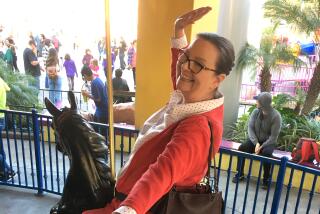Euthanasia and Elderly
- Share via
Mary Alice Altorfer is misdirecting her concerns about nursing home patients like Mary, about whom she expressed her concerns about euthanasia (“It’s What’s Best for Her, Isn’t It?” Commentary, Dec. 28). Her worry about the potential ease by which the Marys of the world might be put away as part of the euthanasia process is valid, but is the wrong concern at this time even with Oregon’s recent law potentially allowing highly regulated physician-assisted suicide, not euthanasia, to competent patients.
There is no proposal, nor a jurisdiction in the world, that has considered or accepted euthanasia for those people who are not competent to request the act and consent and participate in its administration. All proposals and programs, including those of the Netherlands, deem it illegal to take the life of a person within the framework of euthanasia without the person’s consent and a full, objective assessment.
The real issue that Altorfer should have addressed is why the Marys of the world should be abandoned in nursing homes to languish in such a way that a stranger’s touch is so welcome. Are we so incapable of voluntarily providing warmth, care, compassion and time to those frail elders, at the end period of life, who have no family or friends to visit or to provide them with fond affection, so that their plight might not be so desperate?
MICHAEL GORDON MD
Geriatric Specialist
Toronto, Canada
* Altorfer’s essay takes the position that “vegetables don’t cry,” and therefore that catastrophically non-functional people in nursing homes have a quality of life worth preserving. The point is exactly that vegetables don’t cry, but that sentient, suffering, agonized human beings do, human beings who are aware of the torture of their daily existence and want relief from it. Those who can still indicate they want to die, or those who have indicated by a living will that they would want to die when they can no longer function, should be permitted (and aided in) this freedom. The “curled in the fetal position” Mary, who rises up to the visitor and clutches her hands, might just as likely be begging for release as expressing joy in love and existence.
It’s true that no one is fit to judge the quality of another person’s life, but if that person says (as my mother said to me recently in the nursing home where she has been paralyzed and on a feeding tube for three years), “This is no way to live,” we had better respect the conclusion she has come to and believe her. Our society, apparently, is more willing to believe in angels (Lucifer and otherwise) than in the truth of those who are suffering greatly and who ask for help when they can no longer take actions to help themselves.
MERRILL JOAN GERBER
Sierra Madre
Gerber’s forthcoming memoir, “Maxie, My Million” (Longstreet Press), is a reflection on life in a nursing home.
More to Read
Sign up for The Wild
We’ll help you find the best places to hike, bike and run, as well as the perfect silent spots for meditation and yoga.
You may occasionally receive promotional content from the Los Angeles Times.






